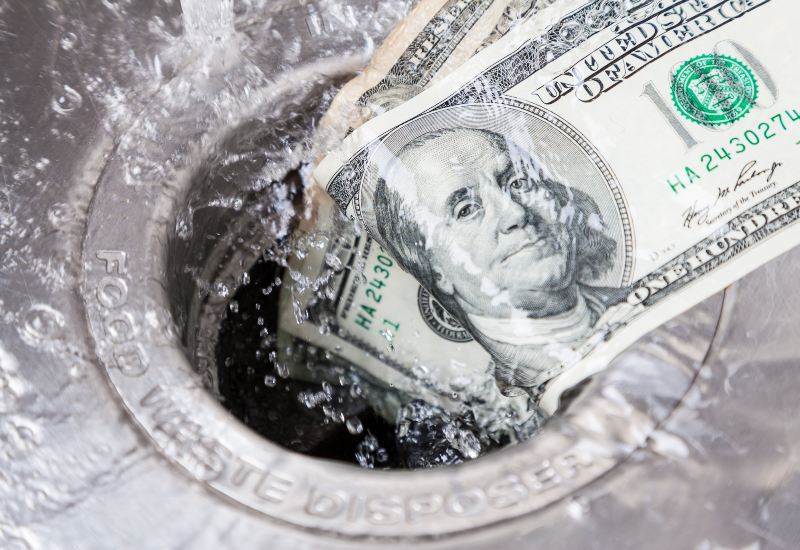
Water bills are a significant monthly expense for many households. If your water bill seems higher than usual lately, you may wonder whether you have any control over the cause. Consider 12 common reasons for a high water bill so you can identify the source and potentially lower your costs.
-
Plumbing Leaks
Leaks can occur in various places, including pipes, faucets, toilets, and irrigation systems. Even small leaks can add up to significant water waste over time. Consider that a single faucet dripping at a rate of one drop per second wastes more than 5.5 gallons per day, or over 2,000 gallons per year.
To detect a plumbing leak, check your water meter before and after a two-hour period when no water has been used. If the meter reading changes, you may have a leak somewhere. -
Running Toilets
A toilet leaking water from the tank to the bowl can waste a significant amount of water each day. If you hear your toilet running even when no one has flushed it, you may need to replace the flapper valve or adjust the water level in the tank.
-
Hot Water Leaks
Hot water leaks can be more difficult to detect than cold water leaks because they often occur inside the walls or under the floors. However, a hot water leak is more costly since it wastes both water and heating energy. If you notice hot spots on the floor or a sudden increase in your gas or electric bill, you may have a hot water leak.
-
Undetected Underground Leaks
Not all plumbing leaks are easy to detect and repair. Some occur underground, buried beneath concrete driveways or foundations. If you suspect an underground leak, contact a professional plumber who uses specialized leak detection equipment to locate the leak for repair.
-
Inefficient Plumbing Appliances
An old washing machine or dishwasher uses more water than a newer, more efficient model. If your appliances are over ten years old, consider upgrading them. When you do, you’re sure to lower your water usage and enjoy additional convenient, energy-saving features.
-
Lawn Watering
It’s normal for water usage to increase in the summer, partly because this is when you water your lawn and garden. Periods of drought can be particularly detrimental to your water bill because you need more water than usual to keep your grass and other plants healthy.
To reduce water usage, run your sprinklers during cool morning hours when evaporation is less significant. Also, avoid watering on windy days, and consider installing a rain sensor to automatically turn off the irrigation system when it’s raining.
-
Swimming Pools & Outdoor Water Features
Swimming pools, fountains, and ponds often use a lot of water, especially if they’re not designed to operate efficiently. Install a pool cover to reduce water evaporation and keep your pool clean. Also, put in a recirculation pump to recycle the water in your outdoor water features.
-
Increased Usage
Sometimes, a high water bill is simply due to increased usage, which may occur when houseguests stay over. The increase could also be seasonal. For instance, hot weather may cause more sweating, which leads to more showers. Your kids are also home more throughout the day during summer break, where they may use more water.
Switch out your faucets, showerheads, and toilets for aerated, low-flow versions to reduce the impact of higher water demand. This is useful in any season, whether the people washing their hands, showering, and flushing the toilet are residents or guests in your home.\
-
Malfunctioning Water Softener
A water softener removes unwanted minerals from hard water for healthier skin and hair, better-tasting tap water, and no hard water spots. However, this device can contribute to high water bills if it stops functioning correctly. If you have a water softener, maintain it properly to prevent wasting water.
-
High Water Pressure
If your water pressure is too high, this means an excessive amount of water flows through your pipes, resulting in increased water usage and a higher bill. To check your water pressure, attach a pressure gauge to an outdoor spigot close to your main water line. Open the spigot to full blast and check the gauge. If the reading lands above 80 pounds per square inch (psi), consider installing a pressure-reducing valve to decrease water usage and avoid straining your pipes.
-
Municipal Water Rate Increases
Your water bill may be high because the utility company increased its rates. Municipalities may increase what they charge for water to fund infrastructure improvements or address water shortages. If you notice a sudden increase, check your water bill closely or contact your water company to see if there have been any recent rate increases.
-
Faulty Water Meter
Water meters measure the amount of water a household consumes for billing purposes. These devices can sometimes malfunction or become inaccurate over time, resulting in a falsely high bill. If you suspect that your water meter is faulty, contact your water company to request a meter test. If testing confirms that the meter is indeed faulty, your utility provider should replace it at no cost to you.
Call Puget Sound Plumbing and Heating
With a little effort and attention, you can reduce your water bill and help conserve this precious natural resource. If you need help fixing a leak, installing efficient plumbing fixtures, or lowering your water pressure, Puget Sound Plumbing and Heating can help. Our team aims to provide quality products and unbeatable services. We do this by only adding skilled, fully licensed plumbers to our crew. Call us at (206) 938-3219 or contact us online to request plumbing services in the Seattle area!


